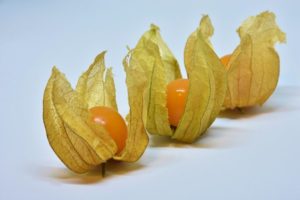Though people who sell the organic process think a limited monoculture past is worth paying a premium for, the future may belong to the groundcherry and other orphan crops, thanks to biotechnology and the gene editing tool CRISPR, the successor to legacy organic processes like Mutagenesis and transgenic options like Genetically Modified Organisms.
Our ancestors genetically modified fruits and vegetables to be bigger, but they went down the path of least resistance. And that is why the groundcherry was left behind despite it being a powerhouse in terms of nutritional value. Packed with Vitamin C, Vitamin B, beta-carotene, phytosterols, and antioxidants, and other things that fad books call a "superfood." As its name implies, groundcherries drop to the ground, often before fully ripening, which puts the tropical-tasting fruit at risk for damage and creates a labor-intensive harvest process. In addition, fruit having to be gathered up from the ground causes concerns for food safety with potential for foodborne illness.

Credit: Boyce Thomson Institute
A jointless mutation in tomatoes may stop fruit drop in groundcherries and thus make it suitable for large scale agriculture, a team writes in Nature Plants.
Selections for mutations in tomatoes have led to improvements in yield and the authors hypothesized that groundcherry genes could be similarly modified for immediate improvements. One concern with the groundcherry is its weedy growth habit. Genetic alterations have led to changes in the hormone that regulates flowering, producing plants which are more compact with fruit in clusters.
They also targeted ways to increase fruit size and weight through a CRISPR-generated mutation, leading to fifty-percent more fruit along a given stem and more seedy sections in each fruit.
Citation: Z. Lemmon et al. ‘Rapid improvement of domestication traits in an orphan crop by genome editing’ was published on October 1, 2018, Nature Plants. DOI:10.1038/s41477-018-0259-x





Comments